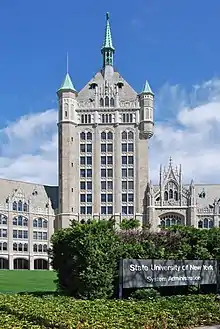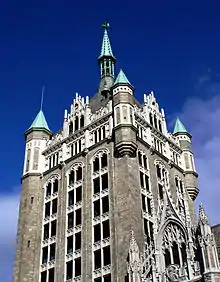State University of New York
The State University of New York (SUNY /ˈsuːni/) is a system of public colleges and universities in New York State. It is the largest comprehensive system of universities, colleges, and community colleges in the United States,[2] with a total enrollment of 424,051 students, plus 2,195,082 adult education students, spanning 64 campuses across the state. Led by Chancellor Jim Malatras, the SUNY system has 91,182 employees, including 32,496 faculty members, and some 7,660 degree and certificate programs overall and a $10.7 billion budget.[3]
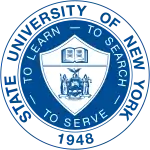 | |
| Motto | To learn, to search, to serve |
|---|---|
| Type | Public university system |
| Established | 1948 |
| Chairman | Merryl Tisch |
| Chancellor | Jim Malatras |
| Vice-Chancellor | Robert Megna |
| Provost | Tod Laursen |
Academic staff | 32,496[1] |
| Students | 424,051[1] |
| Undergraduates | 382,488 |
| Postgraduates | 41,563 |
| Location | , United States |
| Campus | 64 campuses[1] |
| Colors | Blue and Gray |
| Website | www |
 | |
The SUNY system has four "university centers": Albany (1844), Binghamton (1946), Buffalo (1846), and Stony Brook (1957). SUNY's administrative offices are in Albany, the state's capital, with satellite offices in Manhattan and Washington, D.C. With 25,000 acres of land, SUNY's largest campus is SUNY College of Environmental Science and Forestry. While the SUNY system doesn't officially recognize a flagship university,[4][5] the University at Buffalo and Stony Brook University are sometimes treated as unofficial flagships.[6][7][8]
The State University of New York was established in 1948 by Governor Thomas E. Dewey, through legislative implementation of recommendations made by the Temporary Commission on the Need for a State University (1946–1948). The commission was chaired by Owen D. Young, who was at the time Chairman of General Electric. The system was greatly expanded during the administration of Governor Nelson A. Rockefeller, who took a personal interest in design and construction of new SUNY facilities across the state.
Apart from units of the City University of New York (CUNY), SUNY comprises all other institutions of higher education statewide that are state-supported. (SUNY and CUNY are completely separate systems.)
History
New York is one of the last states to set up a state college and university system. The first colleges were established privately, with some arising from local seminaries. But New York state had a long history of supported higher education prior to the creation of the SUNY system. The oldest college that is part of the SUNY System is SUNY Potsdam, established in 1816 as the St. Lawrence Academy. In 1835, the State Legislature acted to establish stronger programs for public school teacher preparation and designated one academy in each senatorial district to receive money for a special teacher-training department. The St. Lawrence Academy received this distinction and designated the village of Potsdam as the site of a Normal School in 1867.[9]
On May 7, 1844, the State legislature voted to establish New York State Normal School in Albany as the first college for teacher education. In 1865, the privately endowed Cornell University was designated as New York's land grant college, and it began direct financial support of four of Cornell's colleges in 1894. From 1889 to 1903, Cornell operated the New York State College of Forestry, until the Governor vetoed its annual appropriation. The school was moved to Syracuse University in 1911. It is now the State University of New York College of Environmental Science and Forestry. In 1908, the State legislature began the NY State College of Agriculture at Alfred University.
In 1946-48 a Temporary Commission on the Need for a State University, chaired by Owen D. Young, Chairman of the General Electric Company, studied New York's existing higher education institutions. It was known New York's private institutions of higher education were highly discriminatory and failed to provide for many New Yorkers.[10] Noting this need, the commission recommended the creation of a public state university system. In 1948 legislation was passed establishing SUNY on the foundation of the teacher-training schools established in the 19th century. Most of them had already developed curricula similar to those found at four-year liberal arts schools long before the creation of SUNY, as evidenced by the fact they had become known as "Colleges for Teachers" rather than "Teachers' Colleges."
On October 8, 1953, SUNY took a historic step of banning national fraternities and sororities that discriminated based on race or religion from its 33 campuses.[11] Various fraternities challenged this rule in court. As a result, national organizations felt pressured to open their membership to students of all races and religions. The SUNY resolution which was upheld in court states:
Resolved that no social organization shall be permitted in any state-operated unit of the State University which has any direct or indirect affiliation or connection with any national or other organization outside the particular unit; and be it further
Resolved that no such social organization, in policy or practice, shall operate under any rule which bars students on account of race, color, religion, creed, national origin or other artificial criteria; and be it further
Resolved that the President be, and hereby is, authorized to take such steps as he may deem appropriate to implement this policy, including the determination of which student organizations are social as distinguished from scholastic or religious, and his decision shall be final.[12]
Despite being one of the last states in the nation to establish a state university, the system was quickly expanded during the chancellorship of Samuel B. Gould and the administration of Governor Nelson A. Rockefeller, who took a personal interest in the design and construction of new SUNY facilities across the state.[13][14] Rockefeller championed the acquisition of the private University of Buffalo into the SUNY system, making the public State University of New York at Buffalo.[15]
Organization
SUNY is governed by a State University of New York Board of Trustees, which consists of eighteen members, fifteen of whom are appointed by the Governor, with consent of the New York State Senate. The sixteenth member is the President of the Student Assembly of the State University of New York. The last two members are the Presidents of the University Faculty Senate and Faculty Council of Community Colleges, both of whom are non-voting. The Board of Trustees appoints the Chancellor who serves as SUNY Chief Executive Officer.
The state of New York assists in financing the SUNY system, which, along with CUNY, provides lower-cost college-level education to residents of the state. SUNY students also come from out-of-state and 171 foreign countries, though tuition is higher for these students. Although tuition is higher for these non-resident students, their tuition is subsidized by New York State taxpayers.
There is a large variety of colleges in the SUNY system with some overlap in specialties between sites. SUNY divides its campuses into four distinct categories: university centers/doctoral-granting institutions, comprehensive colleges, technology colleges, and community colleges. SUNY also includes statutory colleges, state-funded colleges within other institutions such as Cornell University and Alfred University. Students at the statutory colleges who are residents of New York state receive the benefit of state-subsidized tuition while enjoying all of the campus life amenities of the host institutions.
SUNY and the City University of New York (CUNY) are different university systems, both funded by New York State. Also, SUNY is not to be confused with the University of the State of New York (USNY), which is the governmental umbrella organization for most education-related institutions and many education-related personnel (both public and private) in New York State, and which includes, as components, the New York State Education Department and the New York State University Police.
Presidents and chancellors
| Executive | Title | Term |
|---|---|---|
| Alvin C. Eurich | President | January 1, 1949 – August 31, 1951 |
| Charles Garside | Acting President | September 1, 1951 – March 31, 1952 |
| William S. Carlson | President | April 1, 1952 – September, 1958 |
| Thomas H. Hamilton | President | August 1, 1959 – December 31, 1962 |
| J. Lawrence Murray | Acting Chief Administrative Officer | January 1, 1963 – August 31, 1964 |
| Samuel B. Gould | President Chancellor | September 1, 1964 – January 11, 1967 January 12, 1967 – August 30, 1970 |
| Ernest L. Boyer | Chancellor | September 1, 1970 – March 31, 1977 |
| James F. Kelly | Acting Chancellor | April 1, 1977 – January 24, 1978 |
| Clifton R. Wharton, Jr. | Chancellor | January 25, 1978 – January 31, 1987 |
| Jerome B. Komisar | Acting Chancellor | February 1, 1987 – July 31, 1988 |
| D. Bruce Johnstone | Chancellor | August 1, 1988 – February 28, 1994 |
| Joseph C. Burke | Interim Chancellor | March 1, 1994 – November 30, 1994 |
| Thomas A. Bartlett | Chancellor | December 1, 1994 – June 30, 1996 |
| John W. Ryan | Interim Chancellor Chancellor | July 1, 1996 – April 20, 1997 April 21, 1997 – December 31, 1999 |
| Robert L. King | Chancellor | January 1, 2000 – May 31, 2005 |
| John R. Ryan | Acting Chancellor Chancellor | June 1, 2005 – December 19, 2005 December 20, 2005 – May 31, 2007 |
| John B. Clark | Interim Chancellor | June 1, 2007 – December, 2008 |
| John J. O’Connor | Officer-in-Charge | December 22, 2008 – May 31, 2009 |
| Nancy L. Zimpher | Chancellor | June 1, 2009 – September 4, 2017 |
| Kristina M. Johnson | Chancellor | September 5, 2017 – August 31, 2020 |
| Jim Malatras | Chancellor | August 31, 2020 – present |
Student representation
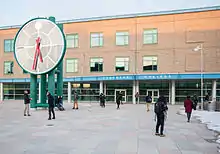
The SUNY Board of Trustees has a voting student member on the board. The student trustee serves a dual role as the President of the Student Assembly of the State University of New York (SUNYSA). SUNYSA is the recognized student government of the SUNY system.
In the 1970s, students pressed for voting representation on the governing board of SUNY colleges. In 1971, the State Legislature added five student voting members to Cornell's Board of Trustees. However, at that time, all members of a board must be over the age of 21 for a corporation to hold a liquor license, so to allow Cornell to retain its license, the legislature had to go back to amend NYS Alcoholic Beverage Control Law § 126(4) to require half the board must be 21.
In 1975, the legislature added a non-voting student seat to the boards of all SUNY units. Two Attorney General of the State of New York opinion letters[16] reduced the parliamentary rights of the student members to participate at meetings and indicated they were not in fact Public Officers, and arguably subject to personal liability from lawsuits. In 1977, another statutory amendment made student members of SUNY councils and boards subject to the NYS Public Officers Law or NYS General Municipal Law and granted student representatives parliamentary powers of moving or seconding motions and of placing items on the agendas of the bodies. Finally, the legislature gave full voting rights to the student members in 1979, resulting in the students of all SUNY units having voting representatives, except for the NYS College of Environmental Science and Forestry. Finally, in 1986, the legislature gave the student representative of that college voting rights as well.[17]
Campuses

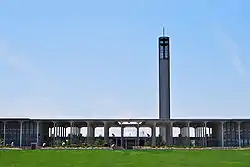
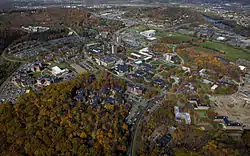
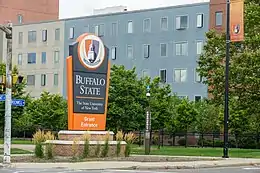
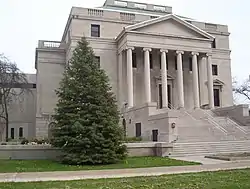
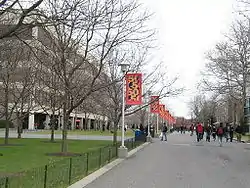
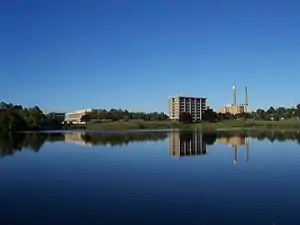
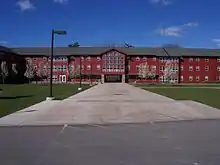
University centers
- Binghamton University[20]
- Stony Brook University[21]
- University at Albany[22]
- University at Buffalo[23]
Doctoral degree granting institutions
- SUNY College of Environmental Science and Forestry[24]
- SUNY College of Optometry[25]
- SUNY Downstate Medical Center[26]
- SUNY Polytechnic Institute[27]
- SUNY Upstate Medical University[28]
- One statutory college at Alfred University:
- Four statutory colleges at Cornell University:
- College of Agriculture and Life Sciences (CALS)[30] (which includes the New York State Agricultural Experiment Station in Geneva)
- College of Human Ecology (HumEc)[31]
- College of Veterinary Medicine[32]
- School of Industrial and Labor Relations (ILR School)[33]
Comprehensive colleges
- Buffalo State College[34]
- Empire State College[35]
- Purchase College[36]
- State University of New York at Geneseo[37]
- State University of New York at New Paltz[38]
- State University of New York at Oswego[39]
- State University of New York at Potsdam[40]
- SUNY Cortland[41]
- SUNY College at Oneonta[42]
- SUNY Fredonia[43]
- SUNY Plattsburgh[44]
- The College at Brockport[45]
- The College at Old Westbury[46]
Technology colleges
Community colleges
- SUNY Adirondack[55]
- SUNY Broome[56]
- Cayuga Community College[57]
- Clinton Community College[58]
- Columbia-Greene Community College[59]
- Corning Community College[60]
- Dutchess Community College[61]
- SUNY Erie[62]
- Fashion Institute of Technology[49]
- Finger Lakes Community College
- Fulton-Montgomery Community College[63]
- Genesee Community College[64]
- Herkimer County Community College[65]
- Hudson Valley Community College[66]
- Jamestown Community College[67] **
- Jefferson Community College[68]
- Mohawk Valley Community College[69]
- Monroe Community College[70]
- Nassau Community College[71]
- Niagara County Community College[72]
- North Country Community College (The College of Essex & Franklin)[73]
- Onondaga Community College[74]
- Orange County Community College [75]
- Rockland Community College[76]
- SUNY Schenectady[77]
- Suffolk County Community College[78]
- Sullivan County Community College[79]
- Tompkins Cortland Community College (TC3)[80]
- Ulster County Community College [81]
- Westchester Community College[82]
- SUNY's sole law school is the University at Buffalo School of Law.[83]
- All of these colleges are in New York State, except that the Jamestown Community College operates its Warren Center in Pennsylvania under a contract with the Warren-Forest Higher Education Council, and the Center is licensed by the Pennsylvania Department of Education. The Warren Center is 25 miles south of Jamestown, New York on the grounds of Warren State Hospital, in North Warren, Pennsylvania.[84]
Statistics
Size and financing
New York's largest public university by enrollment is the State University of New York at Buffalo, which was founded by U.S President and Vice President Millard Fillmore. Buffalo has an enrollment total of approximately 32,000 students and receives the most applications out of all SUNY schools.[85][86][87]
| Campus | Acreage | Founded | Enrollment | Endowment | Operations | Athletics Nickname | Athletics |
|---|---|---|---|---|---|---|---|
| Albany | 586 | 1844 | 17,600 | US$65.3 million | $548.3 million | Great Danes | NCAA Div I America East |
| Binghamton | 930 | 1946 | 16,695 | US$116 million | $456.2 million | Bearcats | NCAA Div I America East |
| Buffalo | 1,346 | 1846 | 31,923 | US$725 million | $3.53 billion | Bulls | NCAA Div I Mid-American |
| Stony Brook | 1,454 | 1957 | 26,814 | US$305.0 million | $2.09 billion | Seawolves | NCAA Div I America East |
Selectivity, admissions and rankings
| School | U.S. News & World Report, Best National Universities 2021 (undergraduate)[88] | Percent students admitted[89] | Middle 50% SAT[90] | Students in top 10% of class | Middle 90% GPA |
|---|---|---|---|---|---|
| Albany | 160th, National Universities (tie) | 56%[91] | 1130–1300 | 20% | 88-94 |
| Binghamton | 88th, National Universities (tie) | 44%[92] | 1300–1450 | Not reported | 92-95 |
| Buffalo | 88th, National Universities (tie) | 51%[93] | 1150–1330 | 35% | 90-96 |
| Stony Brook | 88th, National Universities (tie) | 41%[94] | 1250 -1340 | Not reported | 91 - 97 |
Costs
For the 2017-2018 academic year, tuition costs at SUNY schools for an undergraduate degree are less than two-thirds the cost of most public colleges in the United States. For example, tuition at the University at Buffalo for an undergraduate degree is $9,828 per semester or $27,068 per year for non-resident students.[95] Undergraduate tuition for non-resident students at the University of Maryland is $35,216 per year.[96] Non-resident tuition and fees at University of Oregon are $32,535 per year.[97]
New York State also offers free tuition for all public college and universities for families who have an income of lower than $125,000 and are residents of the state. Other requirements to qualify for free SUNY education include full-time enrollment and staying in the state for a number of years after graduating.[98][99]
In the 2017-2018 award year, 70,694 SUNY students received the Federal Pell Grant.[100]
"No Student Goes Hungry" Initiative
Although 3.3 million SUNY students were eligible for federal SNAP food benefits in 2016, only about half reported participation in the program.[101]
In 2019, a “No Student Goes Hungry” Initiative was implemented, and on-campus food pantries were available at 70% of SUNY locations. Some on-campus pantries serve faculty and staff, as well as students. The remaining 30% of SUNY locations partner with off-site pantries and community organizations to ensure "stigma-free" access to food.[101][102]
Research funding
| School | NSF Funding Rank | Funding Dollars (USD)[103] |
|---|---|---|
| Albany | 134 | 137,759,000 |
| Binghamton | 161 | 76,005,000 |
| Buffalo | 56 | 387,863,000 |
| Brockport | 577 | 1,321,000 |
| Buffalo State | 515 | 2,106,000 |
| Cobleskill | 625 | 908,000 |
| Cortland | 629 | 819,000 |
| Downstate | 211 | 39,354,000 |
| ESF | 259 | 21,239,000 |
| Farmingdale | 441 | 3,213,000 |
| Geneseo | 592 | 1,201,000 |
| Optometry | 428 | 3,637,000 |
| Oswego | 632 | 725,000 |
| Purchase | 567 | 1,433,000 |
| Stony Brook | 97 | 225,712,000 |
| Upstate | 222 | 34,286,000 |
SUNY Chancellor's Award for Student Excellence
The SUNY Chancellor's Award for Student Excellence is an annual award given out by the SUNY system to distinguished student leaders across the State of New York. Established in 1997, the system considers the Chancellor's Award to be "the highest honor bestowed upon the student body."[104]
Athletics
Every school within the SUNY system manages its own athletics program, which greatly varies the level of competition at each institution.
Division I
- The four university centers compete at the Division I level for all of their sports. All but Binghamton field football teams, with Buffalo in Division I FBS (formerly Division I-A) and Albany and Stony Brook in Division I FCS (formerly Division I-AA). The four Cornell statutory colleges compete as part of the university as a member of the Ivy League, an FCS conference that chooses not to participate in the FCS postseason tournament.
Divisions II and III
- Most SUNY colleges, technical schools and community schools compete at the NCAA Division III level.
Other associations
- SUNY Delhi is a member of the NAIA.
- SUNY Canton and SUNY Environmental Science and Forestry are members of the USCAA.[105][106]
- A small number of community colleges compete at the National Junior College Athletic Association throughout their three divisions.
Rivalries
The most prominent intra-SUNY rivalry is between the Albany Great Danes and Binghamton Bearcats. The two belong to the America East Conference. Frequently referred to as the I-88 Rivalry, Binghamton and Albany sit at either end of Interstate 88 (roughly 2.5 hours apart). Both teams are known to post the highest visitor attendance at either school's athletic events. Both schools also have less intense rivalries with a fellow America East member, the Stony Brook Seawolves. In football, a sport not sponsored by the America East, Albany and Stony Brook have a rivalry in the Colonial Athletic Association.
The University at Buffalo tends to have a rivalry in basketball with two private colleges in the same geographical area. Canisius College and Buffalo's South Campus are 2.5 miles apart on Main St. in Buffalo. Their other rival is Niagara University in Lewiston, NY.
SUNY Oswego and SUNY Plattsburgh also share a notable rivalry in Division III Hockey, with that game almost always having the SUNYAC regular season title up for grabs.
SUNY Cobleskill and SUNY Delhi rivalry focuses on basketball, cross country, and previously track, although Cobleskill track and field started competing at the NCAA Division III level in spring 2009. The SUNY Delhi 2003-2004 basketball season was canceled after a basketball game was called with 48 seconds left after several SUNY Delhi basketball players nearly started a brawl in the Ioro Gymnasium at SUNY Cobleskill on Wednesday February 4, 2004.
SUNY Oneonta has developed a rivalry in almost every sport with SUNY Cortland. They share the red dragon as a team nickname, and their matchups are known as the "Battle of the Red Dragons".
There is an unusual sports rivalry between SUNY College of Environmental Science and Forestry and Finger Lakes Community College, with both campuses sponsoring nationally ranked teams in woodsman competitions.
SUNY Press

The State University of New York Press (SUNY Press) is a university press and a Center for Scholarly Communication. The Press is part of the State University of New York system and is located in Albany, New York. It was founded in 1966, and publishes scholarly works in various fields.[107]
The SUNY Press has agreements with several print-on-demand and electronic vendors, such as Ingram, Integrated Books International, EBSCO, ProQuest, Project MUSE, the Philosophy Documentation Center, Google, and Amazon. SUNY Press is also a member of the Association of University Presses.[108]
Books published by SUNY Press are 80% scholarly works from professors within the SUNY system or other schools and universities. Referring to the remaining 20%, which are considered to be more appropriate for a general audience, co-director of SUNY Press James Peltz said, "You don't have to be a scholar to read [them]." [109]
See also
- Education in New York (state)
- List of colleges and universities in New York
- List of largest United States colleges by enrollment
- List of largest universities by enrollment
References
- SUNY. "SUNY FAST FACTS". Retrieved 3 August 2017.
- "Short History of SUNY". The State University of New York. SUNY. Retrieved 2009-04-05.
- Applebome, Peter (2010-07-23). "The Accidental Giant of Higher Education". NYTimes.com. Retrieved 2011-11-10.
- Applebone, Peter (July 23, 2010). "The Accidental Giant of Higher Education". The New York Times. Archived from the original on November 13, 2020. Retrieved December 31, 2020.
- SUNY - The State University of New York [@SUNY] (August 11, 2010). "All 64 of our campuses are our flagships! RT @sewsueme: Fun fact: SUNY has no flagship institution" (Tweet). Retrieved December 31, 2020 – via Twitter.
- "2009-10 Tuition and Fee Rates: A National Comparison" (March 2010). Washington Higher Education Coordinating Board. Retrieved July 15, 2018.
- "Remarks by Governor Eliot Spitzer". The Governor's Site. Retrieved April 30, 2015.
- https://www.newsday.com/news/region-state/spitzer-stony-brook-should-be-flagship-school-1.879792
- http://www.potsdam.edu/about/bicentennial/history.cfm (subscription required)
- Tod Ottman, "Forging SUNY in New York's Political Cauldron," in SUNY at Sixty: The Promise of the State University of New York, ed. John B. Clark, W. Bruce Leslie and Kenneth P. O’Brien (Albany: State University of New York Press, 2010), 19.
- "State U. Bans Social Societies on Bias Count". Cornell Daily Sun. 70 (15). 9 October 1953. p. 1. Retrieved 2010-10-06.
- "WEBB v. STATE UNIVERSITY | 125 F.Supp. 910 (1954) | supp9101835 | Leagle.com". Leagle. Retrieved 2019-10-30.
- "Introduction," in SUNY at Sixty: The Promise of the State University of New York, ed. John B. Clark, W. Bruce Leslie and Kenneth P. O’Brien (Albany: State University of New York Press, 2010), XIX
- SUNY at Sixty, XIX
- "SUNY Buffalo School of Management History". University at Buffalo. 2017. Retrieved October 4, 2017.
- 1975 Op. Atty. Gen., November 25 and 1976 Op. Atty. Gen., June 14
- "Student Members of the Boards of Trustees and College Councils". SUNY. May 28, 1986. Retrieved 2010-12-18.
- https://slcny.libguides.com/slc
- https://system.suny.edu/olis/
- "Binghamton University". binghamton.edu. Retrieved March 25, 2011.
- "Stony Brook University". stonybrook.edu. Retrieved March 25, 2011.
- "University at Albany". albany.edu. Retrieved March 25, 2011.
- "University at Buffalo". buffalo.edu. Retrieved March 25, 2011.
- "State University of New York College of Environmental Science and Forestry". esf.edu. Retrieved March 25, 2011.
- "SUNY College of Optometry". sunyopt.edu. Retrieved March 25, 2011.
- "SUNY Downstate Medical Center". downstate.edu. Retrieved March 25, 2011.
- "State University of New York Institute of Technology at Utica/Rome (SUNY IT)". sunyit.edu. Retrieved March 25, 2011.
- "Upstate Medical University". upstate.edu. Retrieved March 25, 2011.
- "New York State College of Ceramics at Alfred University". nyscc.alfred.edu. Archived from the original on April 8, 2011. Retrieved March 25, 2011.
- "Cornell University College of Agriculture and Life Sciences (CALS)". cals.cornell.edu. Retrieved March 25, 2011.
- "Cornell University College of Human Ecology". human.cornell.edu. Retrieved March 25, 2011.
- "Cornell University College of Veterinary Medicine". vet.cornell.edu. Retrieved March 25, 2011.
- "Cornell University ILR School". ilr.cornell.edu. Retrieved March 25, 2011.
- "Buffalo State College". buffalostate.edu. Retrieved March 25, 2011.
- "Empire State College". esc.edu. Retrieved March 25, 2011.
- "Purchase College". purchase.edu. Retrieved March 25, 2011.
- "SUNY Geneseo". geneseo.edu. Retrieved March 25, 2011.
- "State University of New York at New Paltz". newpaltz.edu. Retrieved March 25, 2011.
- "State University of New York at Oswego". oswego.edu. Retrieved March 25, 2011.
- "The State University of New York at Potsdam". potsdam.edu. Retrieved March 25, 2011.
- "State University of New York College at Cortland (SUNY Cortland)". cortland.edu. Retrieved March 25, 2011.
- "SUNY College at Oneonta". oneonta.edu. Retrieved March 25, 2011.
- "SUNY Fredonia". fredonia.edu. Retrieved March 25, 2011.
- "SUNY Plattsburgh". plattsburgh.edu. Retrieved March 25, 2011.
- "The College at Brockport". brockport.edu. Retrieved March 25, 2011.
- "The College at Old Westbury". oldwestbury.edu. Retrieved March 25, 2011.
- "Alfred State College". alfredstate.edu. Retrieved March 25, 2011.
- "Farmingdale State College". farmingdale.edu. Retrieved March 25, 2011.
- "Fashion Institute of Technology". fitnyc.edu. Retrieved March 25, 2011.
- "Morrisville State College". morrisville.edu. Retrieved March 25, 2011.
- "SUNY Canton". canton.edu. Retrieved March 25, 2011.
- "SUNY Cobleskill". cobleskill.edu. Retrieved March 25, 2011.
- "SUNY Delhi". delhi.edu. Retrieved March 25, 2011.
- "SUNY Maritime College". sunymaritime.edu. Retrieved March 25, 2011.
- "SUNY Adirondack Community College". sunyacc.edu. Retrieved March 25, 2011.
- "Broome Community College". sunybroome.edu. Retrieved March 25, 2011.
- "Cayuga Community College". cayuga-cc.edu. Retrieved March 25, 2011.
- "Clinton Community College". clinton.edu. Retrieved March 25, 2011.
- "Columbia-Greene Community College". sunycgcc.edu. Retrieved March 25, 2011.
- "Corning Community College". corning-cc.edu. Retrieved March 25, 2011.
- "Dutchess Community College". sunydutchess.edu. Retrieved March 25, 2011.
- "Erie Community College". ecc.edu. Retrieved March 25, 2011.
- "Fulton-Montgomery Community College". fmcc.edu. Retrieved March 25, 2011.
- "Genesee Community College". genesee.edu. Retrieved March 25, 2011.
- "Herkimer County Community College". herkimer.edu. Retrieved March 25, 2011.
- "Hudson Valley Community College". hvcc.edu. Retrieved March 25, 2011.
- "Jamestown Community College". sunyjcc.edu. Retrieved March 25, 2011.
- "Jefferson Community College". sunyjefferson.edu. Retrieved March 25, 2011.
- "Mohawk Valley Community College". mvcc.edu. Retrieved March 25, 2011.
- "Monroe Community College". monroecc.edu. Retrieved March 25, 2011.
- "Nassau Community College". ncc.edu. Retrieved March 25, 2011.
- "Niagara County Community College". niagaracc.suny.edu. Retrieved March 25, 2011.
- "North Country Community College (The College of Essex & Franklin)". nccc.edu. Retrieved March 25, 2011.
- "Onondaga Community College". sunyocc.edu. Retrieved March 25, 2011.
- "Orange County Community College (SUNY Orange)". sunyorange.edu. Retrieved March 25, 2011.
- "SUNY Rockland Community College". sunyrockland.edu. Retrieved March 25, 2011.
- "Schenectady County Community College". sunysccc.edu. Retrieved March 25, 2011.
- "Suffolk County Community College". sunysuffolk.edu. Retrieved March 25, 2011.
- "Sullivan County Community College". sullivan.suny.edu. Retrieved March 25, 2011.
- "Tompkins Cortland Community College (TC3)". tc3.edu. Retrieved March 25, 2011.
- "Ulster County Community College (SUNY Ulster)". sunyulster.edu. Archived from the original on May 20, 2011. Retrieved March 25, 2011.
- "Westchester Community College". sunywcc.edu. Retrieved March 25, 2011.
- "University at Buffalo Law School". buffalo.edu. Retrieved August 14, 2017.
- "JCC Warren, PA Center". Jamestown, New York: Jamestown Community College. Retrieved 2011-02-13.
- "SUNY Buffalo: Complete Campus List". Suny.edu. Retrieved 2016-06-20.
- "Chancellors and Presidents of the University". University of Buffalo, The State University of New York. Archived from the original on 2016-06-10. Retrieved 2017-04-12.
- Hill, David J. (April 13, 2017). "Another Record-Breaking Year for Applications to UB." Buffalo.edu. Retrieved July 16, 2018.
- "College profiles". New York: College Board. Retrieved 2010-06-08.
- https://www.suny.edu/media/suny/content-assets/documents/summary-sheets/Admissions_qf_stateop.pdf
- "State University of New York at Albany profile". collegeboard.com. New York: College Board. Retrieved 2015-09-19.
- "State University of New York at Binghamton profile". collegeboard.com. New York: College Board. Retrieved 2015-09-19.
- "State University of New York at Buffalo profile". collegeboard.com. New York: College Board. Retrieved 2015-09-18.
- "State University of New York at Stony Brook profile". collegeboard.com. New York: College Board. Retrieved 2015-09-19.
- "Tuition and Fees - SUNY". buffalo.edu. Archived from the original on 2017-10-22. Retrieved 2015-10-30.
- "University of Maryland Costs". Umd.edu. Retrieved 2018-06-28.
- University of Oregon. "Tuition - University of Oregon". Financialaid.uoregon.edu. Retrieved 2018-06-28.
- Excelsior Scholarship Program. HESC.NY.gov. Retrieved July 16, 2018.
- Jaschik, Scott (April 10, 2017). "New York Adopts Free Tuition." InsideHigherEd.com. Retrieved July 16, 2018.
- "Distribution of Federal Pell Grant Program Funds by Institution and Award Year". www2.ed.gov. 2020-02-26. Retrieved 2020-04-29.
- Food Insecurity Task Force, Quarterly Report, October-December 2018 (March 2019). "Shared Practices" (PDF). Retrieved 2019-11-23.CS1 maint: multiple names: authors list (link)
- Esch, Mary (2018-04-18). "On-campus food pantries help struggling students succeed in school". Christian Science Monitor. ISSN 0882-7729. Retrieved 2019-11-23.
- "Rankings by total R&D expenditures". National Science Foundation. Archived from the original on 2015-03-31. Retrieved 5 May 2015.
- Insider - Buffalo State College - SUNY's Highest Student Honor Awarded Archived 2012-06-10 at the Wayback Machine
- "About SUNY Canton Athletics". Retrieved 20 September 2014.
- "USCAA.com". Retrieved 20 September 2014.
- SUNY Press Mission Statement
- "SUNY Press - SUNY". system.suny.edu. Retrieved 2020-03-19.
- Fox, Deanna (2018-06-08). "SUNY Press a conduit for shared wisdom". Times Union. Retrieved 2020-03-19.
External links
| Wikimedia Commons has media related to State University of New York. |
